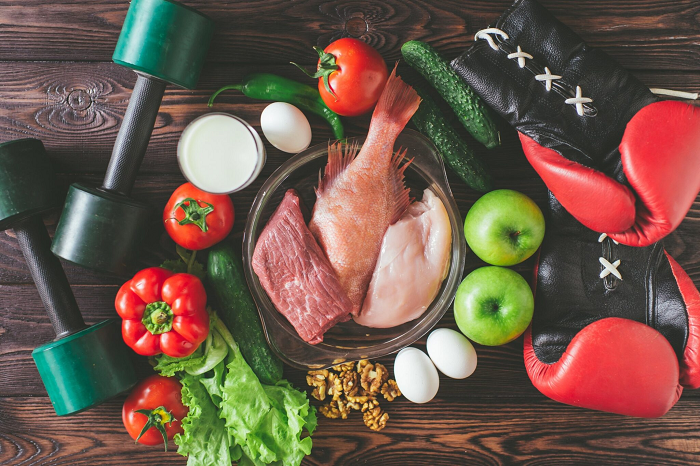Proper nutrition during training is prepared using the required ratio of KBJU in the daily diet. This indicator is calculated individually, but there are approximate consumption limits.
Protein is a building material for the growth and restoration of body cells, the main source of amino acids. In the daily diet it is approximately 0.75 grams per 1 kilogram of adult weight. In addition, protein foods provide a long-lasting feeling of fullness.
High protein foods:
- meat, fish, poultry;
- seafood – shrimp, squid, scallops;
- dairy products;
- nuts;
- pulses.
Fats are responsible for a reserve source of energy, which is activated during periods of food shortage or when the immune system is weakened, for example, during illness. Fats are also necessary for the elasticity of blood vessels, the normal condition of skin, hair, and nails. The best source of fats is vegetable oils: olive, flaxseed, sesame. A large amount of fat is contained in margarine and nuts.
Carbohydrates are the main source of energy for sports and should not be excluded from the daily diet. They help you withstand energy-intensive workouts and intense activities. When creating a workout meal plan, the amount of carbohydrates should be about 310 grams. This figure may differ for men and women.
Carbohydrates are simple and complex. Simple ones are easily digestible and increase blood sugar levels. Regular consumption of simple carbohydrates disrupts the insulin production mechanism. As a result, a person experiences hunger even with sufficient energy. This condition encourages a person to eat, and the extra calories turn into extra pounds.
Simple carbohydrates:
- sugar and sweets;
- bakery products;
- some fruits.
Complex carbohydrates take time to break down, which is why they are sometimes called “slow”. The main function is to store energy for physical activity. Such carbohydrates are recommended to be consumed in the daily diet, including before physical training.
Slow carbohydrates are found in the following foods:
- whole grain cereals;
- pasta from durum wheat;
- Brown rice;
- green vegetables;
- greens – lettuce, spinach;
- legumes.
In other words, simple carbohydrates are digested too quickly and do not provide energy for work. On the contrary, they raise blood sugar levels and cause a gain of fat rather than muscle mass.
Daily calorie consumption is calculated individually and depends on many factors – gender, age, initial weight. It takes into account whether there is physical activity during the day, an active or passive lifestyle.

